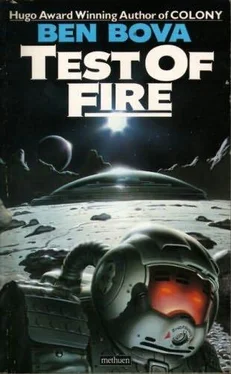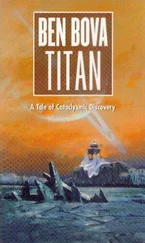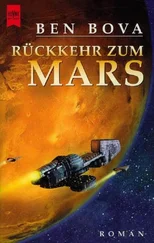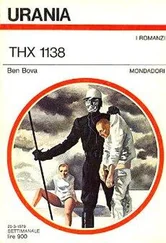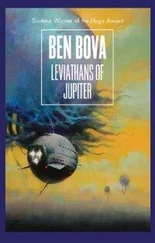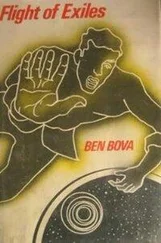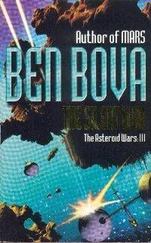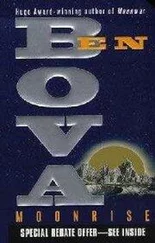Or both.
He almost laughed. The only real friend he had among them was the half-witted Ferret.
Alec looked up. The first hint of dawn was lightening the sky to the east. It would feel good to have sunlight warming him again.
“All right,” he whispered to himself. “Two trucks and twelve men. We 5tart north. Now!”
It was pleasantly cool among the trees. The Sun still felt hot, falling in mottled patches through the swaying branches and lighting up the grassy glades of clearings among the trees. The breeze had a tang to it as it gusted in from the northwest.
The leaves were already falling, their colors fantastic.
Alec had never seen such a profusion of reds and golds before.
But he was not paying attention to the autumn foliage now. He lay on his belly atop a carpeting of soft leaves at the rim of a hill, under the cover of the maples and birches. Out in the cleared valley below stood a walled village. A cluster of little huts with thin plumes of smoke curling from a few chimneys.
Ron Jameson lay beside Alec. “They picked a good location. Couple of klicks out in the open. Nobody can get to them without them seeing him first and closing their gates.”
Nodding, Alec raised his binoculars to inspect the village’s wall. Old cinderblock, mostly. Some newly made brick. Wooden gates, probably scavenged from one of the abandoned cities nearby.
He noticed a few men working in the cornfield between the woods and the village. No women were in sight, although they might have been in among the rows of two-meter-high stalks.
“They’re greedy,” Alec said quietly. “They’ve planted cornfields all the way from the edge of their wall to the edge of the trees. And they’re trying to get a second crop in before the frosts come.”
Jameson grinned. Perfect coyer.
On Alec’s other side, Ferret jabbed an excited finger. “Road,” he said. “Carts. Wagons.”
“They must be carrying on trade with other villages,”
Alec said. “That’s too much corn for them to eat all by themselves.”
“Maybe they supply Douglas’s people?”
Jameson suggested. “If he’s got a sizable army and an organized base near here, he’d need supplies from villages like this.”
Alec scanned the area again. A cloud of dust caught his attention, far down the road toward the horizon. “Truck,” he murmured. “No, it’s a wagon, pulled by horses.”
“Wagon,” Ferret agreed, nodding happily.
He handed the binoculars to Jameson. “Empty, heading in toward the village. Driver and two gunners.”
“Wasn’t there another one yesterday?” Jameson asked, adjusting the focus as he peered through the glasses.
“That’s right. Gianelli spotted it.”
“Just about this time, too.”
Alec smiled. “We can make a Trojan Horse out of the next one.”
“A what?”
“You’ll see,” Alec said.
All through the summer Alec had driven his tiny band northward, toward the area of Douglas’s headquarters. Not that he knew where it was. Only that it was north, toward the lakes.
When he had first reported on meeting Douglas to his mother, she mused, “He was born up in the lake country. It would be just like him to make his home territory into the center of his empire.”
She assigned the satellite observers to scan the area carefully and, sure enough, they reported extensive networks of roads, villages, farms in the area. It all appeared quite settled and serene, with no sign of marauding raider packs molesting the farmers or villagers.
Alec headed for the lake country.
The laser trucks ran out of fuel after the first few days. Alec burned them, rather than let them fall into barbarian hands. But with the loss of the trucks they also lost their only link with home, the truck radios which were capable of reaching the satellite station and, through relay, the Moon. Alec had one of the radio transceivers taken from a truck and carried along.
“Whenever we find a power source for it, we can make contact again,” he told the men.
Gianelli grumbled at the extra few pounds.
Jameson ordered the men to take turns carrying it. Alec talked with Kobol or Lisa or one of the other Council members whenever they could surprise a village or an armed outpost that had a suitable electric power supply. Lisa had supplies dropped for them, with zero success. The supply vehicles were unmanned and virtually unguided, catapulted from the Moon to the satellite station and then nudged into a re-entry trajectory by the satellite crew. They flamed to Earth like great meteors, either missing Alec’s position by enormous margins or being reached first by barbarians who plundered the food, ammunition and supplies inside them long before Alec’s men could reach them.
So they lived off the land. Ferret became invaluable, bringing in food where the lunar invaders could find nothing, slowly teaching them how to hunt, trap, see the landscape and the living creatures who dwelled in it. Ecology became a lifesaving study for Alec and his men. And they stopped thinking of Ferret as a halfwitted spy in their midst.
They also raided villages and took what they needed. Alec tried to do it peacefully whenever he could, but it was seldom possible to take the food people had grown for themselves, their ammunition, boots, or medicine, and do it peacefully.
Especially when Alec had nothing to exchange for the goods he took except his thanks.
They lost three men on such raids. In one of them the seemingly indestructable Jameson took an arrow in his thigh that left a wound that infected badly. He still favored that leg.
Twice they tangled with other raider bands and fled for their lives. The raiders were bigger and knew the territory better. Like primitive tribes, each band had staked out a territory for itself and drove off trespassers.
Feudalism, Alec realized. They protect the villages and in return the villagers supply them with food. He shrugged to himself. Well, it’s a step up from barbarism.
Alec himself was wounded slightly in the arm, and they lost a fourth man the one and only time they went into a city.
Their sporadic contacts with the satellite had at least provided them with information about the radioactivity levels of the cities. Many of the urban areas had not been bombed, and fallout levels had diminished over the quarter-century since the sky burned, although the eastern seaboard from Boston to Norfolk was still a glowing tangle of devastation for fifty kilometers inland.
They had reached the Ohio River, travelling mostly on foot since the trucks had failed. The summer heat was like a weight pressing on them, although they had adapted to the sunshine by tanning darkly. They commandeered trucks or cars wherever they could find them, abandoning them when they ran out of fuel. Once in a while they would find a few horses, but such animals were usually guarded more passionately than food or women by the farmers in the villages. And Alec found it very strange and difficult to ride a vehicle that had a mind of its own. It wasn’t merely a ’201 matter of steering it; he had to fight a battle of wills to make the beast do anything at all.
Cincinnati was to their west and still dangerously radioactive, the satellite sensors showed, from the bombing of the big U.S. Air Force base in nearby Dayton. The cities along the Ohio River were mostly abandoned, emptied because the surviving people could not feed themselves inside their cities. And the diseases that had scourged the survivors had been at their worst in the cities.
But empty or not, the cities were treasure houses of canned food, ammunition, clothing, maps, compasses, vehicles, and even fast fuel dumps that still held usable gasoline. But even after twenty-five years, most of the earthlings shunned all the cities with superstitious dread.
Читать дальше
